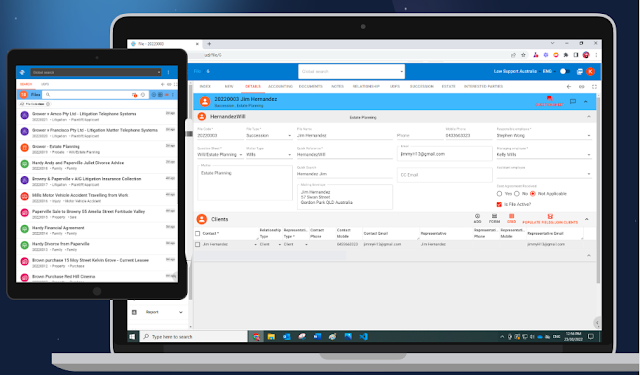Everything You Need to Know About Legal Matter Management Software
In the complex and highly regulated world of legal practice, managing cases, clients, and documents efficiently is paramount. The intricacies of legal matters, from contracts to litigation, require a robust system to ensure smooth operations and compliance with all relevant regulations. This is where legal matter management software steps in. In this article, we will explore everything you need to know about legal matter management software, from its definition and features to its benefits and how it is transforming the legal industry.
Understanding Legal Matter Management Software
Legal Matter Management Software, often referred to as LMMS, is a specialized software solution designed to assist law firms, legal departments, and legal professionals in managing and handling various aspects of their cases, clients, and documents. This technology offers a centralized platform that streamlines the management of legal matters, from case initiation to resolution and beyond.
Key Features of Legal Matter Management Software
1. Case Management: LMMS provides tools for creating, tracking, and managing cases from start to finish. This includes features such as task assignment, case notes, and case status tracking.
2. Document Management: This software enables the efficient organization, storage, and retrieval of legal documents, including contracts, pleadings, and correspondence.
3. Time and Billing: LMMS often includes time tracking and billing features to ensure accurate invoicing and financial management.
4. Calendar and Docket Management: It helps in maintaining calendars, scheduling deadlines, and managing court dates.
5. Communication Tracking: LMMS records all communication related to a case, allowing for easy reference and compliance.
6. Client and Contact Management: This feature assists in maintaining a database of clients and other contacts, including their information, cases, and communication history.
7. Task and Workflow Automation: Automation of repetitive tasks and workflows can improve efficiency and reduce human errors.
8. Reporting and Analytics: Legal matter management software generates reports to provide insights into case progress, performance, and profitability.
9. Compliance and Security: Data security and compliance with legal regulations are paramount in the legal industry, and LMMS often includes robust security features.
10. Integration Capabilities: Many LMMS solutions integrate with other legal software, like eDiscovery and research tools, for seamless operations.
Benefits of Legal Matter Management Software
Now that we've covered the essential features of LMMS, let's delve into the numerous benefits it offers to legal professionals and organizations.
1. Improved Efficiency : Legal matter management software optimizes workflows, automates repetitive tasks, and centralizes case and document management. This leads to improved efficiency, allowing legal professionals to focus on their core responsibilities rather than getting bogged down by administrative tasks.
2. Enhanced Collaboration: Collaboration is key in the legal field. LMMS fosters collaboration by providing a platform for lawyers, paralegals, and other legal professionals to work together, share documents, and communicate seamlessly.
3. Document Control: Effective document management is a critical aspect of legal practice. LMMS ensures that all documents are stored securely, version-controlled, and easily accessible, reducing the risk of document loss or mishandling.
4. Time and Cost Savings: Time-tracking and billing features in LMMS ensure accurate time recording and invoicing. This not only saves time but also enhances revenue collection. In the long run, the software can significantly reduce operational costs.
5. Compliance and Risk Management: Legal matter management software often includes built-in compliance and security features to ensure that sensitive client information is protected, and all legal processes adhere to relevant regulations.
6. Data Analytics and Reporting: Analytics and reporting capabilities provide valuable insights into case performance, allowing legal professionals to make data-driven decisions, improve strategies, and increase client satisfaction.
7. Scalability: LMMS can be customized to the needs of individual law firms and legal departments. As the practice grows, the software can adapt to accommodate increased case volumes and additional users.
8. Better Client Service: With improved efficiency, organized communication, and access to real-time case information, legal professionals can provide better service to their clients. Clients benefit from transparency, prompt responses, and enhanced communication.
9. Streamlined Operations: Legal matter management software streamlines operations by providing a centralized platform where all case-related information and tasks are accessible. This reduces the chances of missed deadlines or overlooked tasks.
Transforming the Legal Industry
The adoption of legal matter management software has been transformative for the legal industry. Here are some key ways in which LMMS is changing the landscape:
1. Digital Transformation: The legal industry, like many others, is undergoing digital transformation. Paper-based processes are being replaced by electronic document management, digital signatures, and online communication. LMMS plays a pivotal role in this transformation by providing the necessary tools and infrastructure.
2. Remote Work Capabilities: The events of recent years, including the COVID-19 pandemic, have necessitated remote work in the legal sector. Legal matter management software allows legal professionals to access case information, documents, and communication from anywhere with an internet connection, making remote work possible and efficient.
3. Enhanced Client Experience: Clients expect transparency, prompt responses, and accessibility from their legal representatives. LMMS enables lawyers to meet these expectations, providing clients with a better overall experience.
4. Improved Decision-Making: Data analytics and reporting features in LMMS empower legal professionals to make data-driven decisions, optimize their strategies, and improve their practice's performance.
5. Risk Reduction: By ensuring compliance with regulations and providing security features, legal matter management software helps law firms and legal departments reduce the risk of data breaches and regulatory violations.
Selecting the Right Legal Matter Management Software
Choosing the right LMMS for your law firm or legal department is a critical decision. To make an informed choice, consider the following factors:
1. Your Firm's Needs: Identify the specific requirements of your firm. What areas of case and document management do you need to improve? Are you looking for a comprehensive solution or specific features?
2. User-Friendliness: The software should be user-friendly, with a minimal learning curve for your team. It should enhance productivity, not hinder it.
3. Integration: Ensure that the LMMS can integrate with other software you use, such as document management systems or accounting software.
4. Customization: Look for software that can be tailored to your firm's unique processes and needs.
5. Scalability: Consider whether the software can grow with your practice as it expands.
6. Support and Training: Check what type of support and training options are available with the software. You want a provider that offers ongoing support and training for your team.
7. Cost: Carefully evaluate the pricing structure and costs involved, including any ongoing subscription fees.
8. Security and Compliance: Ensure the software meets your data security and compliance requirements.
9. Client Feedback: It's helpful to seek feedback from other law firms or legal professionals who have used the software you're considering.
Conclusion
Legal matter management software has become an indispensable tool for modern legal practices. With its capacity to enhance efficiency, improve collaboration, and transform the way legal professionals manage cases and clients, it is reshaping the legal landscape.


Comments
Post a Comment